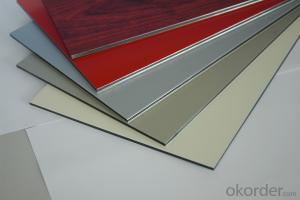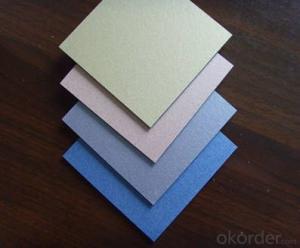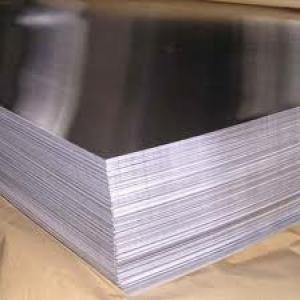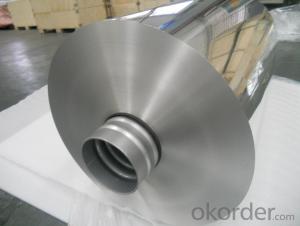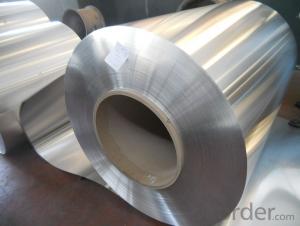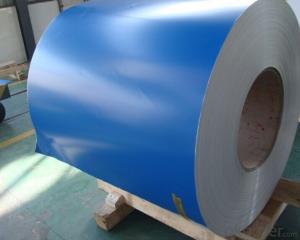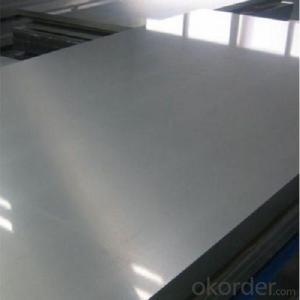Aluminium Composite Panel Facade Decoration-BEST QUALITY
- Loading Port:
- Shanghai
- Payment Terms:
- TT or LC
- Min Order Qty:
- 1000 m²
- Supply Capability:
- 20000 m²/month
OKorder Service Pledge
OKorder Financial Service
You Might Also Like
Structure of ACP Description:
Aluminum Composite Panel is a composite material made of aluminum and non-combustible mineral filled core. Though the core material does contain a small amount of combustible polyethylene, the main ingredient of the non-combustible mineral filled core does not permit the proliferation of flame and restricts smoke. It is a fire-safe material that passes mandatory requirements for exterior and interior application.It is an ideal material for external claddings, roof of pedestrian passage and other architectural applications.
Main Features of ACP:
1) Super werther resistance
2) Light weight easy to process
3) Excellent fire resistance
4) Excellent impact strength
5) Uniform and colorful coating
6) Easy maintenance...and so on
7) Within 15 work days after receiving the first deposite payment .
Images of ACP:
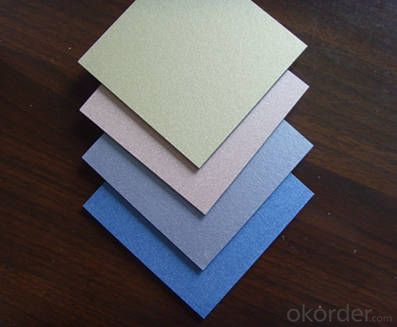
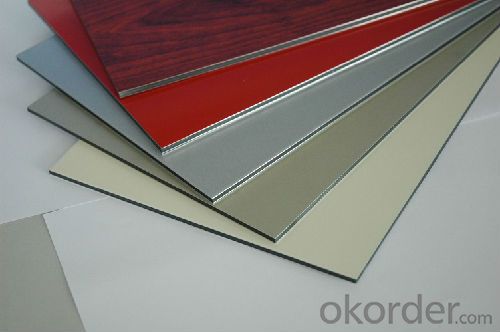
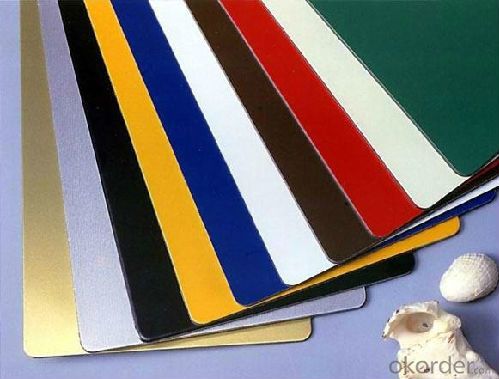
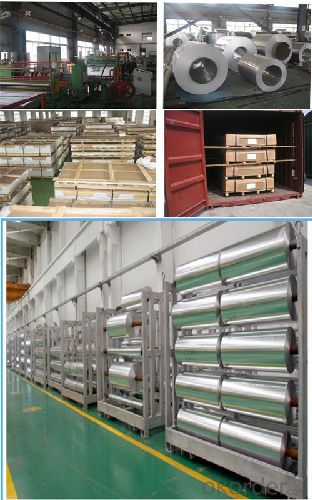
ACP Specifications:
Standard size | 1220*2440*3mm and 1220*2440*4mm |
Accepted Width | Max:1580mm |
Accepted Length | Max:6000mm |
Accepted Thickness | 2mm,3mm,4mm,5mmm,6mm |
Aluminum alloy thickness | 0.10mm0.15mm0.18mm0.21mm0.25mm0.3mm0.35mm0.40mm0.45mm0.50mm |
Weight | 5 kg/m2 base on 4*0.4mm |
Nonstandard | sizes are available according your requirement |
FAQ of ACP:
a.What is monthly capacity
---CNBM is one stated own company and our monthly capacity is about 20000㎡.
b. Now which countries do you export your goods?
---Now we export to South East Asia,Africa, North America,South America ect.
Uses of Aluminum
Aluminum is one of the most useful metals on the planet. Uses of this metal, especially the sheets include industry, technology, and insides homes. In addition to being one of the most useful metals, it is also one of the most common. Everywhere you look you will see aluminum, from aluminum foil in the home to the aluminum bodies of older cars. Aircraft is made out of aluminum and this metal is used to build some buildings as well.
TRANSPORTATION
One of the major categories in which aluminum has a very large influence is in the transportation sector. This metal has many uses in the transportation sector because of its flexibility and very high tensile strength. A very common application in which you would see aluminum used in the transportation sector is aircraft. Most aircraft fuselages and wings are made from aircraft-grade aluminum. This metal can withstand the immense pressure changes that most aircraft endure during a typical flight. Sheet aluminum is also widespread throughout the transportation sector and is usually used to construct railroad cars and truck trailers.
HOUSEHOLD
Another area in which aluminum has many uses is inside the home. One of the most prominent items inside most homes that is made of aluminum is aluminum foil and aluminum sheets.Aluminum foil itself has thousands of applications inside a typical household, such as storing leftover food, making decorations, packing food, and insulating plumbing and electrical work. More uses of aluminum inside the home include some eating utensils, baseball bats, watches and even cooking utensils. Since aluminum has almost no toxicity after processing, it is quite safe to use it in objects that will be put inside the human body, such as eating and cooking utensils, as well as pots and pans.
INDUSTRY
Aluminum has many uses in heavy industry because it can be made in a variety of thicknesses and it also is semi-conductive and reflective of heat and light. This metal is also waterproof after a thickness of greater than one millimeter and therefore can be used to keep liquid out of certain materials and it is also used inside many different consumer electronics devices.
Uses of aluminum are great and they vary depending upon the application being used. This metal can often be found inside homes in the form of aluminum foil, but it is also present on construction sites, inside manufacturing facilities, and inside the electronics that consumers use on an everyday basis.
- Q:Is aluminum sheet resistant to UV rays?
- Yes, aluminum sheet is resistant to UV rays.
- Q:How is the coated aluminum mirror plate produced?
- Film board is in the Aluminum Alloy substrate coated a layer of film, film or film with high light color, surface coated with adhesive compound and into professional. Film covered board - characterized by coated panels, bright luster, can choose a variety of colors, waterproof and fire, with excellent durability (weather resistance, corrosion resistance, chemical resistance) and dirt resistance, anti UV superior performance. Different brands of coated plastic board, its substrate material and thickness of different film covered material and thickness are also different.
- Q:1. Why does aluminium resist corrosion?2. How do we make aluminium stronger?3. Why does titanium resist corrosion?4. What properties make titanium ideal to use in jet engines and nuclear reactors?5. Why do we need electricity to make aluminium and titanium?6. Why does recycling aluminium save electricity?Even if you only know the answer to one question the help will be much appreciated :D
- 1. When exposed to air, pure aluminium rapidly forms a passive oxide layer, alumina, which further inhibits aluminium reactions with other elements. 2. Aluminium can be made stronger by alloying with other elements. One of the most known aluminum alloy is duraluminium, where the principal alloying component is copper. 3. Exactly as aluminium, titanium corrosion resistance is due to its high reactivity with oxygen. When pure titanium is exposed to air it forms a passive titanium dioxide layer on the surfaces exposed which further prohibits other reactions with corrosion agents. 4. The use of titanium in jet engines components is favored by its strength to weight ration, which is unmatched by any other metal. As for the nuclear reactors, its use is preferred because of its superior corrosion resistance associated with fracture toughness and overall durability. 5. Both titanium and aluminium are refined from their respective mined ores - bauxite, for aluminium, ilmenite and rutile for titanium. Basically, these are oxides of the metals. Pure metal has to be reduced from these ores and processes involve use of temperatures up to and sometime exceeding 1000 degrees Celsius, which obviously requires a great consumption of energy, including electricity. Moreover, pure aluminium is obtained in the final processing phase through electrolysis, meaning an electrical current is needed in order to drive the required chemical reactions, thus adding to the electrical consumption. 6. Recycling aluminium from aluminium simply requires the remelting of the metal, eliminating the electrolytic phase that is high electric energy consuming.
- Q:Can aluminum sheets be used in automotive applications?
- Yes, aluminum sheets can be used in automotive applications. Aluminum is lightweight, corrosion-resistant, and has good strength-to-weight ratio, making it an ideal material for manufacturing automotive components such as body panels, engine parts, and structural components.
- Q:Can aluminum sheets be perforated for decorative or functional purposes?
- Yes, aluminum sheets can be perforated for both decorative and functional purposes. Perforating aluminum sheets involves creating a pattern of holes or perforations in the metal surface. These perforations can serve various purposes depending on the specific application. For decorative purposes, perforated aluminum sheets are commonly used in architecture and interior design. The patterns of holes can add visual interest and create unique designs, allowing for the play of light and shadow. It can be used for decorative screens, partitions, facades, and ceiling panels, among other applications. Perforated aluminum sheets offer versatility in design, as different hole sizes, shapes, and arrangements can be used to achieve the desired aesthetic effect. In terms of functional purposes, perforated aluminum sheets provide several advantages. Firstly, they can improve airflow and ventilation in applications such as HVAC systems, air-conditioning units, and speaker grilles. The perforations allow air to pass through while still maintaining the structural integrity of the sheet. Secondly, perforated aluminum sheets can be used for sound absorption and noise reduction. The holes in the sheet disrupt sound waves, reducing noise levels in areas such as auditoriums, concert halls, and industrial facilities. Additionally, perforated aluminum sheets have practical applications in filtration and separation processes. They can be used as screens or sieves to separate particles of different sizes, allowing for the filtration of liquids or gases. These sheets are also used in the manufacturing of various industrial equipment, such as vibrating screens, grain dryers, and centrifuges. In summary, aluminum sheets can indeed be perforated for both decorative and functional purposes. Whether it is to enhance the visual appeal of a space, improve airflow, reduce noise levels, or aid in filtration processes, perforated aluminum sheets offer a versatile solution for a wide range of applications.
- Q:Are 101 aluminum sheets suitable for heat sinks?
- 101 aluminum sheets are not appropriate for heat sinks, as heat sinks are intended to disperse heat and therefore necessitate materials with high thermal conductivity. In comparison to other aluminum alloys often employed for heat sinks, like 6061 or 6063, 101 aluminum possesses inferior thermal conductivity. These alloys exhibit superior thermal conductivity characteristics, enabling them to effectively transfer heat away from the heat source. Consequently, it is advisable to utilize aluminum alloys that are specifically engineered for heat sinks to guarantee optimal heat dissipation and cooling performance.
- Q:How do aluminum sheets perform in terms of heat reflectivity?
- Aluminum sheets exhibit remarkable heat reflectivity, making them exceedingly efficient. Their ability to effectively deflect heat and light away from surfaces minimizes heat absorption, thus rendering them perfect for scenarios where heat control is paramount, like roofing, insulation, and solar panels. The reflective quality of aluminum sheets aids in curbing energy consumption by preventing excessive heat accumulation, leading to a cooler atmosphere. Moreover, the reflectivity of aluminum also lends itself to a multitude of industrial and scientific applications, including the production of reflectors, heat sinks, and optical mirrors.
- Q:Do 101 aluminum sheets require any special maintenance or care?
- No, 101 aluminum sheets do not require any special maintenance or care. They are known for their durability and resistance to corrosion, making them relatively low-maintenance materials.
- Q:Are aluminum sheets resistant to saltwater corrosion?
- Yes, aluminum sheets are highly resistant to saltwater corrosion.
- Q:What is aluminium plate L2-Y2?
- China plastic deformation of pure aluminum grades are 1080, 1080A, 1070, 107000A (L1), 1370, 1060, 1050 (L2), 1050A (L3), 1A50 (LB2), 1350, 1145, 1035 (L4), 1A30 (L4-1), 1100 (L5-1), 1200 (L-5), 1235. Iron and silicon are their major impurities and are increasing by the number of brands.2, Y2: indicates that the material is in a semi hard state
1. Manufacturer Overview |
|
|---|---|
| Location | |
| Year Established | |
| Annual Output Value | |
| Main Markets | |
| Company Certifications | |
2. Manufacturer Certificates |
|
|---|---|
| a) Certification Name | |
| Range | |
| Reference | |
| Validity Period | |
3. Manufacturer Capability |
|
|---|---|
| a)Trade Capacity | |
| Nearest Port | |
| Export Percentage | |
| No.of Employees in Trade Department | |
| Language Spoken: | |
| b)Factory Information | |
| Factory Size: | |
| No. of Production Lines | |
| Contract Manufacturing | |
| Product Price Range | |
Send your message to us
Aluminium Composite Panel Facade Decoration-BEST QUALITY
- Loading Port:
- Shanghai
- Payment Terms:
- TT or LC
- Min Order Qty:
- 1000 m²
- Supply Capability:
- 20000 m²/month
OKorder Service Pledge
OKorder Financial Service
Similar products
New products
Hot products
Hot Searches
Related keywords
